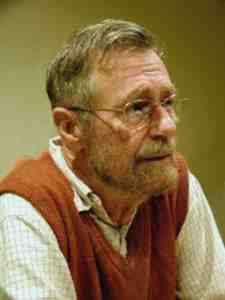| Edsger Dijkstra Born This Day In 1930 |
| Written by Sue Gee | |||
| Monday, 11 May 2020 | |||
|
Today marks the 90th anniversary of the birth of Edsger Wybe Dijkstra, whose paper "GOTO considered harmful" not only initiated an enduring debate but also set a trend for headlines that extended into other disciplines. He made many other significant contributions that shaped and influenced the field of computer science and is known for witty aphorisms.
Edsger Wybe Dijkstra (1930 - 2002) Edsger Wybe Dijkstra was born in Rotterdam on 11 May 1930. His mother was a mathematician and his father a chemist. While working as a programmer at the Mathematisch Centrum in Amsterdam from 1952 to 1962, he graduated in mathematics and theoretical physics from the University of Leiden (1956) and took his PhD from the University of Amsterdam (1959). His thesis 'Communication with an Automatic Computer', was devoted to a description of the assembly language designed for the Xl, the first commercial computer developed in the Netherlands and also dealt with a new concept - an interrupt. From 1962 to 1984 he was a professor of mathematics at the Eindhoven University of Technology and from 1973 he was also worked, from home, for the Burroughs Corporation, a company known for innovative hardware architecture. He was the company's only research fellow and as this post meant he made frequent trips to the USA he reduced his university appointment to one day per week - Tuesday which soon became known for the seminars he held dubbed the 'Tuesday Afternoon Club.' In 1984 when he moved to the USA to take up the Schlumberger Centennial Chair in the Computer Science Department at the University of Texas at Austin a new 'branch' of the Dijkstra ground-breaking contributions to computer science ranged from the engineering side to the theoretical one and covered several areas including compiler construction, operating systems, distributed systems, sequential and concurrent programming, software engineering and graph algorithms. Many of his papers, often just a few pages long, are the source of whole new research areas and several concepts that are now completely standard in computer science were first identified by Dijkstra and bear names coined by him. A Google search for Dijkstra suggests that his shortest path algorithm, Dijkstra's algorithm is what he is best known for - but many would disagree. Google also comes up with a short selection of his quotes and these are delightful: Computer science is no more about computers than astronomy is about telescopes.
Program testing can be used to show the presence of bugs, but never to show their absence! The question of whether a computer can think is no more interesting than the question of whether a submarine can swim. To know more about Dijkstra's influence on computer science, and the GOTO Considered Harmful see our history article, Edsger Dijkstra - The Poetry Of Programming.
More InformationEdsger Wybe Dijkstra (1930-2002): A Portrait of a Genius Related ArticlesFirst Ever Dijkstra Fellowship Shared by David Chaum and Guido van Rossum Edsger Dijkstra - The Poetry Of Programming To be informed about new articles on I Programmer, sign up for our weekly newsletter, subscribe to the RSS feed and follow us on Twitter, Facebook or Linkedin.
|
|||
| Last Updated ( Monday, 11 May 2020 ) |


